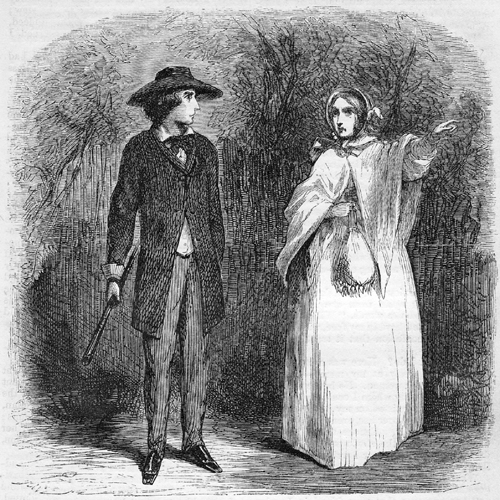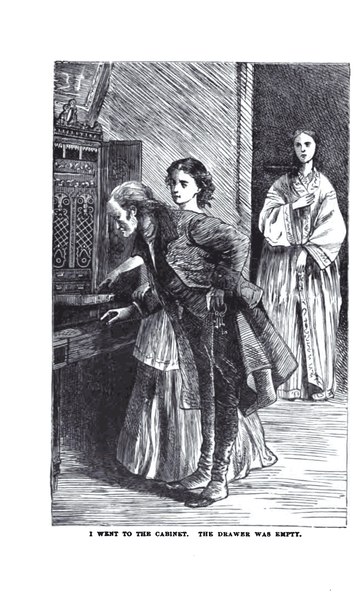 My obsession with Wilkie Collins started, strangely, with The Moonstone.
It's often credited with being the first "detective novel," but it
isn't. It is considered a classic, but it's boring and poorly plotted. I
read it to please my father, who had loved it. When I told him what I
thought of it, he said, "Oh, yes, I remember now, it is boring. Try The Woman in White, that's much better."
My obsession with Wilkie Collins started, strangely, with The Moonstone.
It's often credited with being the first "detective novel," but it
isn't. It is considered a classic, but it's boring and poorly plotted. I
read it to please my father, who had loved it. When I told him what I
thought of it, he said, "Oh, yes, I remember now, it is boring. Try The Woman in White, that's much better."Indeed. I spent that year collecting and reading every Collins novel I could find. The Woman in White, while perhaps the least needing of publicity, is the best book with which to introduce Wilkie Collins to the uninitiated.
Funny - or revealing - that my personal experience was quite the opposite. I, too, had my first taste of Collins with The Moonstone but I loved and still love it; multiple visits have not eroded its charm a little bit. I don't find it boring at all, and the plotting is one of the things that make it a favorite of mine. Part of the book's appeal is to witness the birth of a genre - yes I know L'Affaire Lerouge came first, but there's no denying The Moonstone is closer to detective fiction as we know it. T.S. Eliot may have overstated his case but not by much.
Fresh from The Moonstone I went on to read The Woman in White with great expectations as I'd been repeatedly told it was even better, and... well... I liked it, but was somewhat disappointed as I didn't think it lived up to its reputation. Sure the writing was great and the characterization too, but the plot failed to elicit significant interest or thrills from me. Don't get me wrong: it wasn't boring, but neither was it extremely compelling. Suffice to say that I never felt the urge to re-read it.
 Part of my disappointment may have to do with the fact that unlike The Moonstone it is not a detective novel. There is a mystery, or kind of, but the emphasis is on suspense, not detection. The guilty party is known almost from the start and the book is not about unmasking him but tweaking his schemes. All fine if you're into that kind of thing; the problem is, I'm not - much. I'm very much a puzzle/mystery-focused reader and that's probably why I've never been keen on crime novels or noir fiction - genres where there is nothing or little to solve.
Part of my disappointment may have to do with the fact that unlike The Moonstone it is not a detective novel. There is a mystery, or kind of, but the emphasis is on suspense, not detection. The guilty party is known almost from the start and the book is not about unmasking him but tweaking his schemes. All fine if you're into that kind of thing; the problem is, I'm not - much. I'm very much a puzzle/mystery-focused reader and that's probably why I've never been keen on crime novels or noir fiction - genres where there is nothing or little to solve.Back in the Golden Age, when puzzle and plot were paramount and the traditional model was mostly unquestioned even by those trying to break free from it, The Moonstone was by far the most admired of the two novels. But times and priorities have changed and The Woman in White is much closer to our definition of what a good mystery - I mean, a good crime novel must be.
Shifting tastes and evolving definitions account for the difficulty in identifying the Great Ancestors of the genre. To an orthodox reader/scholar including, say, Balzac's A Murky Business in the Canon makes no sense - it is obviously not a detective story. For the more modern-minded, however, the book has criminal events at its heart and is high on realism and characterization so it qualifies. Here like everywhere else in the genre, judging requires agreeing on definition and standards as Chandler in an exceptional bout of wisdom noted. And there is very little agreement on anything nowadays in the mystery field.
1 commentaire:
Oh, but there IS a great mystery at the heart of The Woman in White! We may know who the villain is, but we don't know what he has done, what his secret is!
I will leave our disagreement over The Moonstone alone, being content in finding another fan of Wilkie Collins is sufficient happiness for me. I will say, while lacking a mystery component, No Name is, in my opinion, of course, the best of all the Collins novels, for reasons to numerous to bore you with here.
Happy reading!
Enregistrer un commentaire